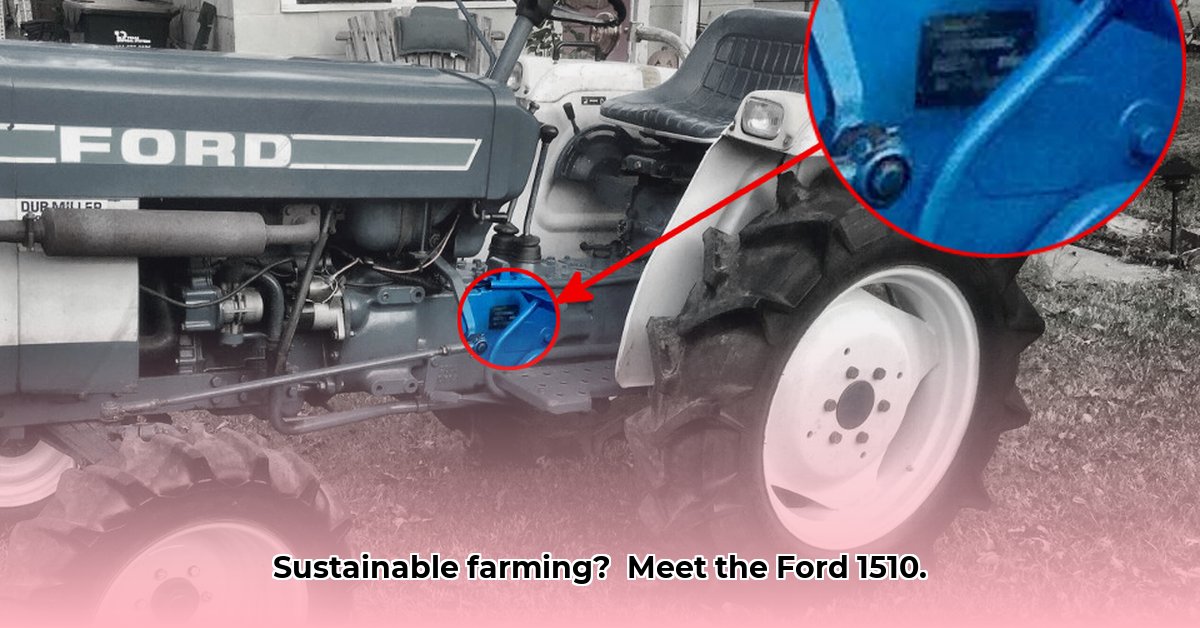
The Ford 1510, a compact tractor produced from 1983 to 1986, presents a compelling case study in sustainable agriculture. While its age might initially seem a drawback, its inherent strengths in fuel efficiency, longevity, and soil conservation offer unique advantages for environmentally conscious farmers. For detailed specifications, check out the Ford 1510 specs. This article explores both the positive and negative sustainability aspects of the Ford 1510, providing practical guidance for its responsible use.
Sustainability Advantages
Fuel Efficiency: A Smaller Footprint, Less Fuel Consumption
The Ford 1510 boasts a relatively small 6.9-gallon fuel tank. While precise fuel consumption data remains elusive for this model, its compact size and engine suggest superior fuel efficiency compared to larger tractors of its era. This inherent fuel economy translates directly to reduced operating costs and a smaller carbon footprint. Further research comparing its fuel consumption to modern tractors is warranted for a more complete assessment. The potential for reduced fuel consumption is a significant point in favor of sustainable operation.
Longevity and Repairability: Built to Last, Easy to Fix
Many Ford 1510s continue operating efficiently decades after their manufacture, a testament to their robust construction. This exceptional longevity significantly reduces the environmental impact associated with frequent tractor replacements. Moreover, the relative simplicity of the design and the availability of parts—though dwindling—make repairs manageable. Online communities and used equipment dealers offer valuable resources for sourcing parts and troubleshooting mechanical issues, further extending the tractor's lifespan and minimizing waste from disposal.
Compact Design: Gentle on the Soil
The Ford 1510's compact design minimizes soil compaction compared to its larger, heavier modern counterparts. Reduced compaction leads to improved soil structure, better water infiltration, and potentially higher crop yields. This, in turn, decreases the reliance on chemical fertilizers, contributing significantly to sustainable farming practices. The smaller footprint is a considerable advantage for environmentally friendly operations.
Sustainability Disadvantages
Safety Concerns: Older Technology, Higher Risks
The Ford 1510's safety features are considerably less sophisticated than those on modern tractors. The Roll Over Protective Structure (ROPS), a crucial safety component, is a simpler, less protective two-post design compared to the advanced, four-post systems found in contemporary models. This necessitates extra caution during operation. The lack of modern safety features presents a significant risk factor that must be diligently addressed.
Emission Standards: Non-Compliance and Environmental Impact
The Ford 1510's diesel engine does not meet current emission standards. This means its operation contributes to higher greenhouse gas emissions than modern, more regulated tractors. It's crucial to understand and comply with all local and national environmental regulations before operating this tractor, potentially limiting its use to minimize its environmental impact. Failure to maintain compliance could result in legal and environmental penalties.
Practical Considerations for Sustainable Use
Finding a Ford 1510
- Online Marketplaces: Explore online auction sites and classifieds.
- Auctions: Attend local agricultural equipment auctions.
- Networking: Leverage farmer networks and local agricultural communities.
Maintenance and Repair
- Regular Maintenance: Maintain a dedicated schedule for oil changes, filter replacements, and fluid inspections.
- Repair Manuals and Online Resources: Utilize online forums and repair manuals for troubleshooting and part identification.
- Community-Based Repair: Consider tapping into local repair networks for collaborative problem-solving and parts sharing.
Safety Precautions
- Operator Training: Ensure proper training before operation.
- Safety Equipment: Always wear appropriate safety gear, including eye protection, gloves, hearing protection, and sturdy footwear.
- Cautious Operation: Exercise extra care due to the limited safety features inherent in older models.
Legal Compliance
- Regulatory Research: Thoroughly research local and national regulations governing tractor operation and emissions.
- Emission Compliance: Understand the limitations imposed by non-compliance with current emission standards and operate accordingly.
Conclusion
The Ford 1510 offers a unique perspective on sustainable agriculture. Its inherent longevity, fuel efficiency, and compact design contribute to environmentally conscious farming. However, its safety limitations and non-compliance with current emission standards necessitate careful consideration and responsible mitigation strategies. By prioritizing maintenance, safety, and regulatory compliance, farmers can harness the potential of the Ford 1510 while minimizing its environmental impact and maximizing its utility as a tool for sustainable agriculture. Further research into sustainable repair practices, alternative fuels, and safety modifications would further enhance this tractor's role in long-term sustainable farming practices.